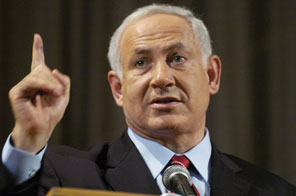Netanyahu's Russia visit to focus on Iran
JERUSALEM: Israel's prime minister said Sunday he would press for "crippling sanctions" against Iran when he visits Moscow this week — a trip that comes as the Russians seem increasingly willing to heed such a call.
Benjamin Netanyahu will meet Russian leaders just days after Iran announced it would be enriching uranium to higher levels. That process could be used to build bombs if ramped up further and has fueled Israel's conviction that Iran wants to ultimately develop nuclear weapons.
"Israel believes that severe pressure should be imposed on Iran — and first and foremost very harsh sanctions, what the U.S. secretary of state called 'crippling sanctions,'" Netanyahu told his Cabinet ahead of his departure for Moscow later Sunday.
A Russian company is building Iran's first nuclear power plant, and Moscow traditionally has resisted new sanctions against Iran. But that could be changing. The chief of Russia's Security Council warned last week that the new enrichment plans show the suspicions about Iran's intentions are well-founded.
Israel considers Iran its greatest threat, citing Tehran's support for Arab militants, its president's repeated references to Israel's destruction and Iran's nuclear program. Iran insists it is not trying to make a nuclear weapon.
While Israel has said it hopes diplomacy will resolve the nuclear standoff, it has not ruled out military action. In 1981, Israeli warplanes destroyed an Iraqi nuclear reactor.
During Netanyahu's three-day trip, he is expected to urge Russia to abandon plans to sell advanced surface-to-air missiles to Tehran. Such missiles would make it much harder for Israel to take military action against Iran.
Iran has defied five U.N. Security Council resolutions — and three sets of U.N. sanctions — aimed at pressuring it to freeze enrichment, and has instead steadily expanded its program.
Russia, one of the five veto-wielding permanent members of the U.N. Security Council, has close military and economic ties with Iran and plays a crucial role in the debate over imposing additional sanctions. China, which relies on Iran for energy supplies, is the only other major power resisting further sanctions.
After four decades of Cold War animosity, ties between Moscow and Israel improved significantly after the Soviet Union collapsed in 1991. Israel is also home to more than 1 million Soviet emigres.
But Moscow's positions on Iran and arms sales to Syria have strained ties, as did Israeli weapons sales to Georgia, which Russia briefly invaded in 2008 in support of pro-Russia secessionists. Israel has since scaled back its weapons sales to Georgia.
This will be Netanyahu's first official visit to Moscow, though Israeli media reported that he made a secret visit in September.
According to various Israeli media reports, the prime minister either pushed the Russians to halt arms sales to Iran, warned of an impending strike against Iranian nuclear facilities or discussed the disappearance of a Russian-crewed freighter.
Netanyahu said Sunday he would also solicit Russian support for advancing stalled Mideast peacemaking.
Moscow has repeatedly stated its desire to host a Mideast peace conference and to involve Gaza's Islamic militant Hamas leaders, an idea strongly opposed by Israel and the U.S.
Last week, Hamas' supreme leader visited Moscow and met with Russian Foreign Minister Sergey Lavrov. Israel, which considers Hamas to be a terrorist group, protested the visit.






